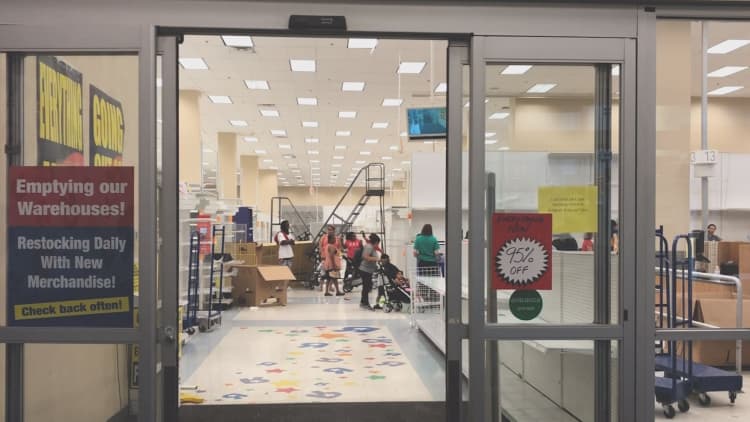
Toys R Us shuttered its doors in the U.S. on Friday, leaving in its wake a great deal of sadness, pockets of anger and some slim hope.
The retailer filed for bankruptcy this past September with $4.9 billion in debt, a vestige from its $6.6 billion acquisition by Kohlberg Kravis Roberts, Bain Capital Partners and real estate investment trust Vornado Realty Trust in 2005. Five months later, it announced plans to liquidate its U.S. business.
Since then, there has been an outpouring of nostalgia for childhood toys shopping. There is dread of a holiday season without the often slightly disorganized Toys R Us stores. December will also be the first without Toys R Us's founder, Charles P Lazarus, who passed away in March.
There has been anger too. Roughly 30,000 workers are out of a job and no one is getting a severance. Former employees have started groups, the Dead Giraffe Society, to share resumes and experiences.
Investigations continue into the retailer's cause of death. Among them, the Minnesota State Board of Investment is suspending its investment to KKR until it further understands KKR's role in the retailer's demise, according to media reports.
Some have refused to accept the end as final. Toys R Us former CEO, Gerald Storch, is trying to pull together a plan that could resurrect the business and save employees their jobs, sources familiar with the situation tell CNBC. The New York Post first reported the efforts.
The chances of success, though, are slim. It would take an extensive amount of capital to buy stores, distribution centers and rebuild or create anew a Toys R Us website. Then, there is the simple fact that starting any business begins as a loss-making venture.
To have products in Toys R Us stores, Storch and his investors would need to convince toy companies like Mattel and Hasbro to ship their toys to the revived company. They would also need to do so fast: retailers and toy companies are already preparing for the holiday season. Some shoppers have been taking advantage of fire sale prices at Toys R Us liquidation sales to prepare for December, which will likely eat into those later sales.
Every one of these feats needs sign off from a number of parties who were recently burnt by the Toys R Us bankruptcy and liquidation — toy companies, landlords and investors. Once bitten (hard), twice shy.
For these reasons, most other efforts to carry off similar feats have failed. When Sports Authority liquidated two years ago, rival sports chains Modell's Sporting Goods and Sports Direct were going to make a similar bid to save the company. Those plans would have cost the retailer roughly $1 million per store, according to a source familiar with the situation. They fell apart.
But even if Storch does not succeed, the Toys R Us name can live on. It is selling its intellectual property, the results of which are to be announced in early August. With that intellectual property a buyer can take the Toys R Us name and logo and resurrect it. That won't stop Toys R Us from liquidating, and it won't give back employees their jobs, but it could ensure the next generation of children have the experience of shopping at a Toys R Us.
That would be a move with far more precedent. After Twinkies-owner Hostess Brands announced it was liquidating in 2012, there was an outpouring of nostalgia for the cream-filled pastries that accompanied lunch boxes for a generation. Shelves of convenience stores were emptied and the pastry began to pop up on Ebay. Investor Apollo Global Management and Metropoulos & Company bought the Twinkie brand, along with several others owned by Hostess, and resurrected them. They have since taken the new company public through a reverse IPO.
Retailers or others that buy the Toys R Us IP would have a number of options. Should Target buy the brand, for example, it can open up a store-within-a-store concept as it expands its toy business. Another investor or retailer could also create pop-up shops that appear only for the holiday season, a logical move since that's when Toys R Us does the heft of its sales anyway.
Even, Amazon could acquire the Toys R Us website, giving it a line into the nostalgia the brand evokes — and the brand with an infamously rickety website, the internet platform it always needed.


